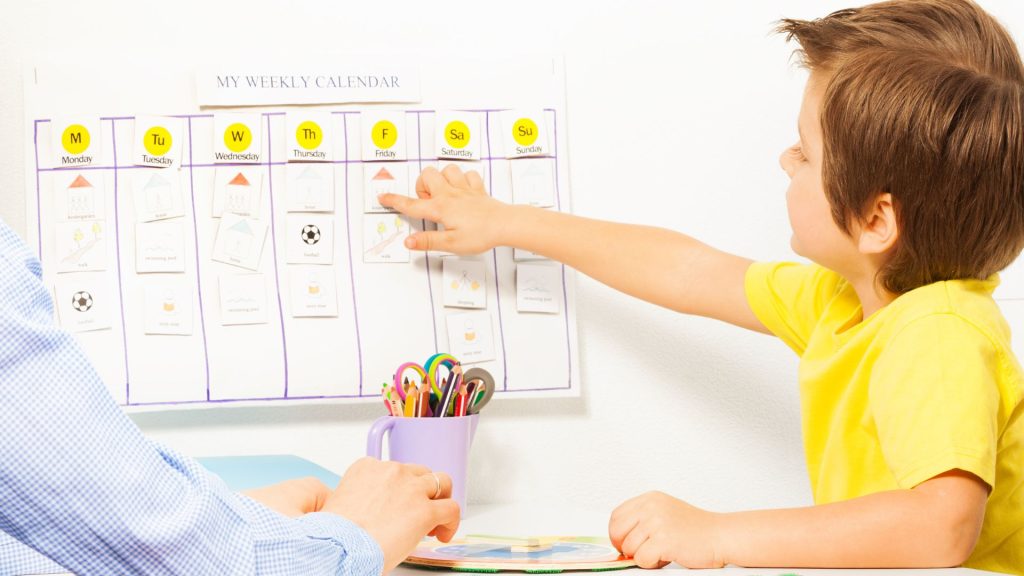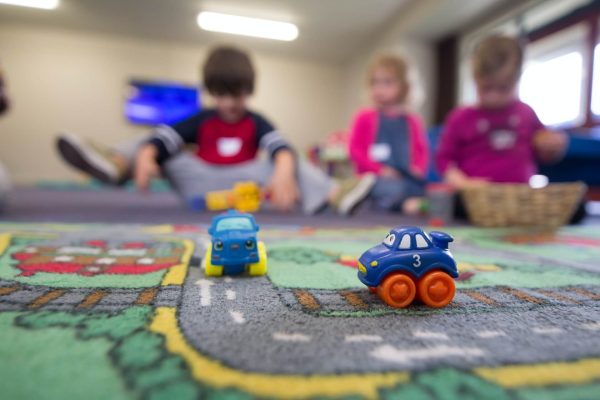The start of the school year is a time of excitement, as well as new expectations and demands.
Recent advances in our understanding of early childhood reveal that children who have a history of separation and loss may experience higher levels of anxiety than their peers at times of transition and in unfamiliar situations. This is true for children who joined their family by way of adoption, even if the adoption occurred when the child was an infant.
In preparing for new teachers and classes, remember that your child’s temperament and the presence of caring adults will influence how confidently your child steps beyond the protective “umbrella” of home and navigates the school year ahead.
Here are some suggestions from The Cradle about how to support your adopted child, whether your child is beginning kindergarten or returning to elementary, middle school or high school.
Visit The School with Your Child Before the Year Starts
For elementary school children, especially children entering kindergarten or transferring to a new school, attend an open house and/or make an appointment with your child’s teacher or school social worker school before classes begin. If this is not possible, a visit to the school playground and finding the entrance door is a second option. Taking pictures of the school and reviewing what the school looks like and where things are is another way to help younger students familiarize themselves with the school.
For rising middle school and high school age children, schools often provide an opportunity for students to visit their new school with their classmates. If this is not an option, make an appointment to visit your child’s middle school or high school and if possible, “walk their schedule.” If available, summer sports programs and summer school at the new school can ease the transition as well.
Talk to Your Child’s Teacher About Adoption
Open a channel of communication with your child’s teacher at the start of the school year. Find time to talk with the teacher about adoption, including positive adoption language. Offer to provide resources for talking about adoption in the classroom, including children’s books about families and adoption.
Adoptive Families, an award-winning online resource for adoptive parents, is an excellent source of ideas. Visit its website at adoptivefamilies.com.
Plan for Common Challenges that Adopted Children Encounter at School
For adopted children and teens, the stress of navigating new classrooms and teachers, interacting with friends and other students, and increasing academic demands can overwhelm their coping strategies and trigger feelings of abandonment, social anxiety and questions about their identity. Keep an eye out for some common challenges and consider whether it may be time to see an adoption-competent therapist for additional support. Some things to keep in mind:
Watch for Signs of Struggle
If your child tends to become dysregulated at times of transitions or in unfamiliar situations, consider providing the school with information that will help your child’s teacher better understand your child’s needs, preferences and challenges.
Remember that how a problem is defined often determines the solution that is identified. For example, children who struggle with emotional/behavioral regulation or who have a high need for control are often described as “defiant.” The solution to “defiance” is disciplinary action. In contrast, if a child’s behavior is defined as a need for improved sensory integration and self-regulation, then intervention is focused on skill building and environmental modifications.
- For more information about this topic, refer to the Adoption Learning Partners course with Dr. Dan Griffith, Ph.D., Sensory Integration and Self-Regulation: Tips for Parenting Sensational Kids
Request Accommodations
Learning challenges are often grouped under the terms learning delays, differences, and disabilities. If your child has a history of prenatal substance exposure, prematurity or other early adversity, or is experiencing difficulties at school, educate yourself about the learning accommodations provided by 504 Plans and Individualized Educational Plans (IEPs). It is never too early to ask for a case study evaluation to determine whether your child is eligible for special educational services and/or learning accommodations.
- This article provides a concise summary of IEPS and 504 Plans
Create a Safe Place to Express Feelings About Being Adopted and Race
As a parent, you know that adoptive families encounter intrusive and insensitive comments about adoption. This is especially true for children in “conspicuous adoptions” (i.e., where you and your child do not look biologically related). Prepare your child for insensitive comments from others about adoption, being adopted and race. Phrases such as “not wanted,” “given up for adoption,” “real parents,” “lucky child” and “not looking like your family” can be upsetting and harmful to a child’s self-confidence.
Remind your child that they know more about adoption than people who are not adopted. Encourage your child to talk to you or another trusted adult about their feelings, including feelings about adoption, race and feeling different. Validate your child’s experience when they do share, using “emotion coaching” strategies.
Plan Around the School’s Meal Schedule
School lunch schedules vary widely, from as early as 10 a.m. to as late as 2 p.m. Many children experience behavioral challenges (e.g., irritability, inattention) when their blood sugar drops. This is especially true for some adopted children who have experienced early adversity. If this has been an issue before or becomes an issue for your child, talk to your child’s teacher about accommodations to allow for small, healthy snacks during the school day.
Establish Consistent Routines for Sleeping and Homework
Children’s bodies respond more acutely to lack of rest, and for some, lack of sleep can amplify behavioral issues. Before the school year begins, implement a school-centered bedtime and wake-up schedule. For elementary school age children, consider creating a “picture schedule” and “picture calendar” so that your child has a visual representation. For older children, help them harness the efficiency of their cell phone alarms. Revisit the plan and refine the schedule after two to four weeks, if needed.

Regarding homework, help your older school age child/teen determine the time of day and conditions when studying is most effective and efficient for them. Are they an early bird or a night owl? Support emerging executive functioning skills by helping your child prioritize subjects, reduce distractions, set aside time and space for homework, and break big projects into smaller steps.
Make Time to Connect at Home
With busy family schedules centered around parents’ jobs, school and extracurricular activities, it can be easy to lose sight of the importance of time to connect as a family. Remember, however, that the attachment relationship with your child or teen is an invaluable resource that needs to be nurtured and supported. Emotional connection to trusted people helps all of us to regroup, recover and carry on. Time to connect can be as simple as a bedtime story, cuddle time while watching a favorite show, playing a board game or pizza night. Enjoy being together and refrain from questioning your child and airing grievances. Remember that finding joy in being with your child/teen is one of the best ways to nurture their identity and self-esteem.
Educate the School About Ways to Support All Adopted Children
Encourage and support the school in being inclusive in their language and activities about families in general. Consider donating adoption books to the school library and explain why you like the books and why they are important. Often books with adoption storylines have something of value for every child, whether they are adopted or not. Consider that many superheroes and Disney characters have lost a parent or are adopted, including Superman, Black Panther, Spiderman and Cinderella, to name only a few.
The following are excellent resources about adoption and different kinds of families:
If you need help preparing your child/teen for school or additional support navigating school challenges, adoption-competent therapists at The Cradle’s Center for Lifelong Support are here to help you. Send an inquiry online or call 847–475–5800 for more information.














